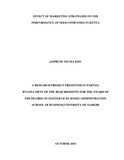| dc.description.abstract | Seed companies today are facing unprecedented challenges in marketing their products
due to the level of competition being experienced in Kenya. Since the liberation of the
industry 1n 1992, there has been an increased number of seed firms competing for the
same market that used to be controlled by a few. The old traditional media channels used
to market seed products and their services and in the process persuade customers are
losing momentum and effectiveness due to changing customer needs. Today customers
are becoming more choice, informed and have alternatives thus calling for continuous
repositioning of marketing strategies in order to survive. Incorporating internal and
external environment therefore becomes a necessity for long term survival of seed firms.
Today‟s businesses opt to adopt marketing strategies because it would result in a quick
and cheap means of penetration the market as well as enabling them to be committed to
business with the aim of more customers which result in improving business
performance. The objective of the study was to determine the effect of marketing
strategies on the performance of seed companies in Kenya. The study used a cross
sectional descriptive survey design. The population of the study comprised all the 112
seed companies in Kenya. The data used is primary one that was collected through self administered
questionnaire. The data is analyzed by the use of descriptive statistics. The
regression analysis is used to assess the effect of marketing strategies on the performance
of seed companies in Kenya. The study found out that the marketing strategies used by
the seed companies were found to be pricing, people, processes, and place, product and
promotion strategies. Pricing strategy was used by the seed companies in determining the
price of seeds after taking into consideration competitors‟ prices and price changes and
response to market changes. The study found out that the processes strategy enabled the
seed companies to differentiate themselves through packaging in branded materials,
marketing of final seeds and production of seeds in order to be consistent in production.
The product strategy was found to be efficient in meeting customer wants, providing
products with low probability of failure, developing products that have broad market
appeal, developing innovative new products and offering a broad product line. The seed
companies were found to be using promotional strategy to advertise their products
through various media, to elicit attention, interest, desire and action, and focusing on
customer needs. The marketing strategies used by the seed companies were found to have
resulted in increased average brand equity and market share, company net profit,
increased customer satisfaction, increased customer loyalty which is success factors on
the performance of any strategic organization. The regression analysis established that
marketing strategies influence the performance of seed companies‟. The marketing
strategies were found to explain 82.5% of the performance of seed companies. | en_US |

